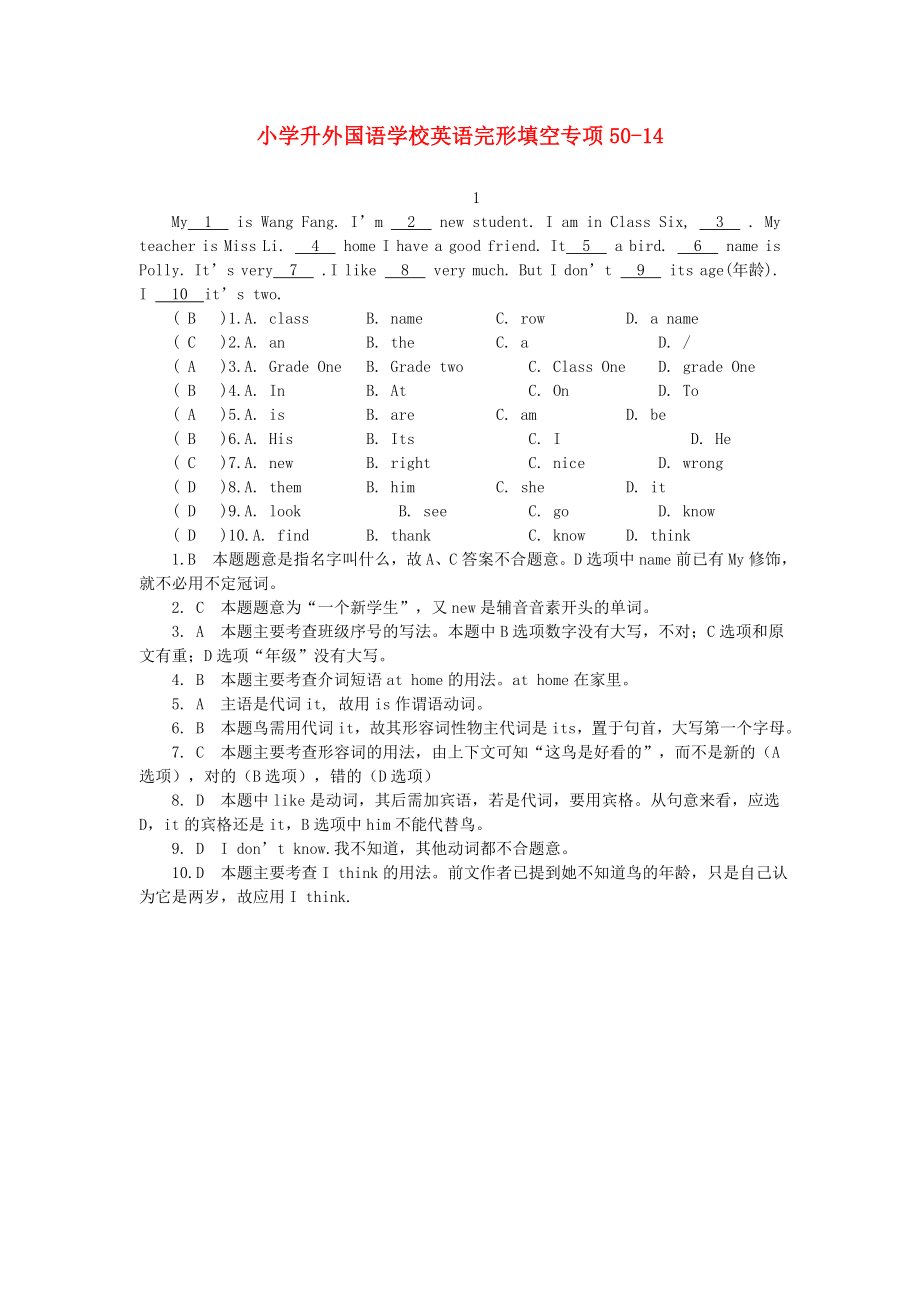《寧夏外國(guó)語(yǔ)學(xué)校小升初英語(yǔ)專項(xiàng)訓(xùn)練 完形填空14》由會(huì)員分享,可在線閱讀��,更多相關(guān)《寧夏外國(guó)語(yǔ)學(xué)校小升初英語(yǔ)專項(xiàng)訓(xùn)練 完形填空14(2頁(yè)珍藏版)》請(qǐng)?jiān)谘b配圖網(wǎng)上搜索��。
1�、小學(xué)升外國(guó)語(yǔ)學(xué)校英語(yǔ)完形填空專項(xiàng)50-14
1
My 1 is Wang Fang. I’m 2 new student. I am in Class Six, 3 . My teacher is Miss Li. 4 home I have a good friend. It 5 a bird. 6 name is Polly. It’s very 7 .I like 8 very much. But I don’t 9 its age(年齡). I 10 it’s two.
( B )1.A. class
2、 B. name C. row D. a name
( C )2.A. an B. the C. a D. /
( A )3.A. Grade One B. Grade two C. Class One D. grade One
( B )4.A. In B. At C. On D. To
( A )5.A. is B. are C. am D. be
( B )6.A. His B. Its C. I D. He
( C )7.A. new B. right C. nice D
3�、. wrong
( D )8.A. them B. him C. she D. it
( D )9.A. look B. see C. go D. know
( D )10.A. find B. thank C. know D. think
1. B 本題題意是指名字叫什么,故A�、C答案不合題意。D選項(xiàng)中name前已有My修飾�,就不必用不定冠詞。
2. C 本題題意為“一個(gè)新學(xué)生”����,又new是輔音音素開頭的單詞。
3. A 本題主要考查班級(jí)序號(hào)的寫法�。本題中B選項(xiàng)數(shù)字沒(méi)有大寫,不對(duì)���;C選項(xiàng)和原文有重����;D選項(xiàng)“年級(jí)”沒(méi)有大寫�。
4.
4��、B 本題主要考查介詞短語(yǔ)at home的用法����。at home在家里��。
5. A 主語(yǔ)是代詞it, 故用is作謂語(yǔ)動(dòng)詞�。
6. B 本題鳥需用代詞it,故其形容詞性物主代詞是its��,置于句首����,大寫第一個(gè)字母��。
7. C 本題主要考查形容詞的用法����,由上下文可知“這鳥是好看的”,而不是新的(A選項(xiàng))�����,對(duì)的(B選項(xiàng))����,錯(cuò)的(D選項(xiàng))
8. D 本題中l(wèi)ike是動(dòng)詞��,其后需加賓語(yǔ)��,若是代詞�,要用賓格�。從句意來(lái)看,應(yīng)選D��,it的賓格還是it����,B選項(xiàng)中him不能代替鳥。
9. D I don’t know.我不知道��,其他動(dòng)詞都不合題意�。
10.D 本題主要考查I think的用法。
5��、前文作者已提到她不知道鳥的年齡���,只是自己認(rèn)為它是兩歲�,故應(yīng)用I think.
2
Look at the picture. It’s 1 picture 2 a park(公園)���。 In the park 3 are some big trees and some flowers. 4 the trees there are some birds. There is a river in the park. In the river there is 5 . 6 are in the boat.
6��、There is 7 in the river, too. Can it jump(跳)��?Yes, It can. Look! There is a cat 8 the river. It wants to catch the fish(魚). “Come here, fish! ” says the cat.
“Would you 9 something to eat?” “No, thank you! I 10 you’d like something to eat. Goodbye!”
( A )1.A. a B. the C. an D
7�、. /
( C )2.A. in B. on C. of D. to
( C )3.A. these B. those C. there D. here
( A )4.A. In B. Behind C. Under D. near
( B )5.A. a girl B. a boat C. a boy D. a dog
( C )6.A. Some woman B. Some girl C. Some boys D. A girl
( D )7.A. a tree B. a cat C. a f
8、lower D. a fish
( C )8.A. in B. under C. near D. on
( A )9.A. like B. look C. find D. help
( D )10.A. swim B. jump C. look D. think
1. A 當(dāng)可數(shù)名詞單數(shù)初次出現(xiàn)時(shí)���,其前一般要加不定冠詞a或an�。picture前應(yīng)用a.
2. C a picture of…意為“一幅…畫”����。
3. C 本題主要考查There be句型的用法。由上下文可知本句所示意思為“某處有某物”
4. A 由題意可知“樹
9��、上有一些鳥”����,故用介詞in���,其他介詞均不合題意�����。
5. B 從上下文可以看出“河里有一艘船”����。
6. C 本題主要考查名詞的數(shù)。A��、B選項(xiàng)中some不可修飾woman和girl����,D選項(xiàng)中g(shù)irls不可用a修飾。
7. D 本題主要考查名詞的判斷�。由下文和貓之間的對(duì)話,可看出應(yīng)是“一條魚”���。
8. C 對(duì)于“貓”來(lái)講�,它應(yīng)是在河邊����,它不會(huì)游泳,所以不可能在河里�、河面上。更不可能在河底�����。故選C。
9. A 本題主要考查交際用語(yǔ)“Would you like……”的用法���。它主要用于詢問(wèn)某人是否有某種需要時(shí)�,常用在商店����、飯店或家里。
10.D 本題主要考查動(dòng)詞的辨析���。由文中可以看出���,這里是魚反駁貓的一句話,反映魚的機(jī)智�����,應(yīng)用“認(rèn)為��,想”����,其他選項(xiàng)均不能表達(dá)魚的本意���。
 寧夏外國(guó)語(yǔ)學(xué)校小升初英語(yǔ)專項(xiàng)訓(xùn)練 完形填空14
寧夏外國(guó)語(yǔ)學(xué)校小升初英語(yǔ)專項(xiàng)訓(xùn)練 完形填空14

